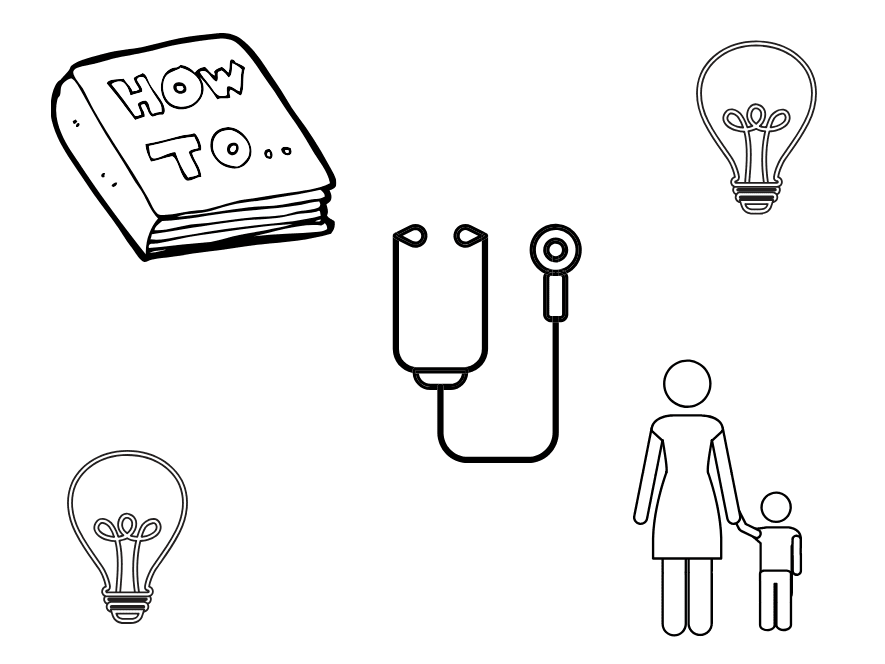Your child has a mental illness. When they were young, you could reassure them and find solutions to their challenges. Now your child is an adult, and knowing how to help is harder.
You’re not alone! Fifty percent of mental illness begins by age 14, and 75% begins by 24. That means there are parents across the country trying to understand how they can help their grown children with mental illness.
It can be difficult to navigate the path of mental illness when your adult child receives a diagnosis. As a parent, you are an essential support system for your child, and you are not helpless.
Get Educated
The most critical action you can take as a parent is to learn about your child’s mental health condition and how they experience it. In past generations, it was more common and accepted to dismiss an issue like major depression as something that should be “snapped out of” or “pushed through” with the right attitude. Today, society views mental illness as a serious medical issue that requires treatment, just like a physical illness. That means there are plenty of resources you can use to educate yourself!
If they have a psychiatric emergency, the National Suicide Prevention Lifeline is open 24/7 at 1-800-273-8255. There is also a Crisis Text Line service, which connects a person in need to a counselor via text message.
An adult child with mental illness such as depression, bipolar disorder, OCD, or a personality disorder needs an educated support system. When you learn as much as you can, you can provide the proper feedback and not judge your child’s circumstances. When someone is going through a mental health crisis, the worst thing people closest to them can do is place blame or shame.
Mental illness often has a genetic component, just like some families deal with heart conditions or cancer risks. Look into your family history to see if anyone else has had a similar diagnosis. Finding evidence of their child with a mental illness or someone for your child to talk to should help them understand they do not have a character flaw.
A family member who has successfully experienced treatment can provide invaluable encouragement.
Encourage Treatment
The mental health condition is not the “fault” of your adult son or daughter, but it’s their responsibility to get the treatment they need. This can be a difficult situation to navigate for a few reasons:
- Your adult child may be resistant to get help.
- You are accustomed to doing whatever you can to ease their suffering, but an adult can’t be forced to get treatment.
- They might not believe they have a true mental health disorder that needs professional treatment.
It’s critical for any patient to “buy into” their treatment as prescribed by a health provider. If someone isn’t willing to comply with medication or be honest in therapy, it’s impossible to get better. Your child needs to come to the decision to get better on their own, or their efforts won’t last long.
Everyone is different, so properly encouraging treatment doesn’t have a one-size-fits-all solution. In some cases, you may need to provide the same research and education to them that you’ve done for yourself.
In other situations, it may be necessary to rally the family around the person who’s suffering. Sometimes unconditional love and support can be sufficient motivation. If all else fails, consult with a therapist to figure out the best way to make a breakthrough.
Navigate Dual Diagnosis
Understanding and encouraging a child with a mental health disorder is hard enough. Doing so for an adult child who has a dual diagnosis can be extra tricky. A dual diagnosis is a mental illness that occurs with a substance abuse disorder or with another disorder, like depression and anxiety. It’s very common. The National Alliance on Mental Illness estimates that 7.9 million people in the U.S. experience both a mental health condition and a substance use disorder.
By its very nature, drug addiction is a mental health issue that often provides a dopamine reward. If your adult child has a mental health disorder, they may want to get better in order to alleviate their pain and go on with life.
But substance abuse and addiction are mental health issues that incentivize against treatment. Your child may be reluctant to admit they have a substance problem because using helps ease their mental health symptoms.
This is where encouragement may become difficult for you. Before they can address their mental health issue, your child needs to be aware of their substance abuse problem.
Research the best substance abuse treatment centers in your area. Many addiction facilities address co-occurring disorders (dual diagnosis). If you know your child has a mental health condition, find a facility that offers holistic treatment.
Give your child information about it. If you think an intervention is in order, talk to a professional at one of these treatment centers. They can help you do it right, so you encourage your child rather than shame or anger them.
As a parent, you should provide support and encouragement, but you should also set boundaries and not enable substance abuse. If your adult child agrees to enter a substance abuse recovery program, schedule your own sessions with the counselors.
Your presence in your adult child’s life is essential, and you’ll want to ensure that everything you do is in sync with the recovery team’s plan.
Learn About Treatment Options for Mental Illness
Mental health conditions are typically treated through talk therapy, medications, or a combination of both.
Talk Therapy
Talk therapy is essential for the treatment of any mental health condition. It doesn’t have side effects and helps your child understand their feelings, cope, and build strategies for wellness.
Talk therapy requires “buy-in” from the patient, so encourage your adult child to be as open and honest as possible. Remind them that therapy is a safe place, to be honest, and that the law requires therapists to keep conversations confidential unless the patient or someone discussed in a session is at risk of harm or abuse.
To find a therapist, visit the website of your child’s insurance provider. Or go to PsychCentral® at https://psychcentral.com/find-help/. Remind your child that they’re not married to their therapist! They can always switch to someone who helps them better.
Medication
For some patients, medications aren’t necessary, and talk therapy does the trick. For others, medication is essential and drastically improve the quality of life.
If your adult child is considering medication, look for a psychiatrist with a good reputation. Just like talk therapy, it’s important for the patient to “buy into” their treatment so they adhere to the treatment plan and get the best results possible.
A Different Option: TMS
One cutting-edge treatment is transcranial magnetic stimulation (TMS). TMS treatments are non-invasive and drug-free. They can be used to treat depression, anxiety, OCD, and PTSD, and they work by reactivating neural pathways that become underactive in patients with depression. TMS therapy is remarkably effective, safe, and provided under the care of a psychiatrist.
If TMS sounds right for your child, Success TMS is a reputable provider with locations across the country. They specialize in getting insurance approval set up quickly, so treatment can start right away.
Manage Health Insurance
If your child is under 26, they may still be under your health insurance plan. Even if they have their own coverage, you may need to help them navigate their benefits. Here are some general guidelines:
- Insurance from an employer – If your adult child gets health insurance from their employer, they are covered for mental health treatment.
- Insurance from the Marketplace – If your child doesn’t get insurance from their employer, they should make a point to get it from the individual marketplace. Under Marketplace plans, mental and behavioral health services are essential benefits. Your child can sign up during open enrollment.
- Financial Assistance – Many states provide financial assistance for health insurance, as well as Medicaid for low-income people.
Once they have the insurance card in hand, they can call their provider to get proper information on copays, deductibles, and benefits.
Stay Strong After Recovery
Once your adult child has been through treatment, be aware that relapses can occur. Put that research and education you’ve done to good use, and learn about relapse triggers, so you can help your adult child work through stressful situations and any additional mental health episodes they experience.
Check-in often to make sure he or she is taking medication as prescribed or seeing a therapist as a part of their routine.
Take Care of Yourself
A mental health crisis is stressful for everyone in the family, especially when a child suffers from a mental illness. As a parent of someone who is affected, it’s critical that you set aside time and energy to maintain your wellness.
Talk therapy is an excellent option, as it only requires one hour a week and is highly effective. Seeing a therapist regularly will allow you to sort through your challenges and set proper boundaries.
Your therapist will also have the background to provide the right context for what your child is going through. This can give you a “playbook” for the process.
People are often ashamed to talk about mental health due to stigma. It can be frightening when your adult child has a mental health issue, but remember:
They—and you—are not alone. One in four Americans has a mental health issue in any given year. It’s very likely that your neighbors or co-workers have dealt with something similar. Just like them, with the right plan and attitude, your child will get through theirs and return to a happy, productive and enjoyable life.








23 Comments
This is helpful. Bipolar disorder is the probable diagnosis of our 30 year son. It’s very complex.
Adult son.was stable for 20 yes. Went off meds due to head shock and cant sleep. Kasier said nothing else they can do. Now he is in psychosis. I dont have anything to show i can be updated to his mental status while in hospital.
Is there anything I can get ?
I tried calling him to put me on the list.
He said to confusion and hung up.
HELP!
Yes perhaps so! Check into neural feedback, it can help with sleep issues some brain injuries depression and anxiety into healthy issues. Look up the website ISNR for more info. Get reliable help, not “Nicky mouse” biofeedback. It’s not a total guarantee, but everyone benefits Somehow. It helped me tremendously!
bgbfbgfb
My son is 30 ptsd and bipolar was in army several years ago in and out of hospital, homeless on edge . Fights against us all the time va is about to give up on him from what I understand. How do I help
Lillian,
I can understand the frustration you have, as you cannot force your son to do anything at this point. It is all his choice.
The VA does offer mental health services to veterans, but it is also much easier now to seek help from the private sector as well.
Another option would be community mental health services.
Perhaps a fresh set of eyes and some separation from the military, which might be a point of contention for your son, would be a good approach that he would be more willing to consider.
PTSD and Bipolar disorder are both treatable conditions, but if left untreated, can lead to significant dysfunction.
Ultimately, he has to find himself with no other option but to get help.
Then when he is ready, you can help him find a good fit for a mental health provider in your area.
Good luck to you.
еуіе
23yo son hasn’t slept in a few days and is sitting outside at night talking to self! HELP!
There are government resources that can help
https://www.mentalhealth.gov/get-help/immediate-help
23yo son hasn’t slept in a few days and is sitting outside at night talking to self! HELP!
Have son who is very depressed and unable to function with daily tasks, sleeps late , will not confront issues. He is 46 years old and may have to live at home. Lost job and now not able or willing to find new one. We are so lost as to how to help him. Was living with girlfriend and she has told him to leave.
Hi Kathleen,
I am so sorry your son is struggling like this with depression. As a mother as well, I know this is affecting you too.
Please know that there is help out there. If you can be a support to him in finding a mental health provider, then he can begin some form of treatment that can get him back on the right path.
Depression is very treatable. He does not have to suffer with symptoms. He can recover from this.
Depression does impact day to day functioning, work, school, relationships. The first thing to remind him is that there is hope and that he does not have to continue to endure these symptoms that he cannot control or wish away.
Treatment options are out there. The first step is for him to get to a mental health provider in your area and have an evaluation. All he needs to do is take the first step, and then one step at a time after that.
I wish you both well.
Hi Kathleen,
I am so sorry your son is struggling like this with depression. As a mother as well, I know this is affecting you too.
Please know that there is help out there.
If you can be a support to him in finding a mental health provider, then he can begin some form of treatment that can get him back on the right path.
Depression is very treatable. He does not have to suffer with symptoms. He can recover from this.
Depression does impact day to day functioning, work, school, relationships. The first thing to remind him is that there is hope and that he does not have to continue to endure these symptoms that he cannot control or wish away.
Treatment options are out there. The first step is for him to get to a mental health provider in your area and have an evaluation. All he needs to do is take the first step, and then one step at a time after that.
I wish you both well.
Hi Kathleen,
I am so sorry your son is struggling like this with depression. As a mother as well, I know this is affecting you too.
Please know that there is help out there.
If you can be a support to him in finding a mental health provider, then he can begin some form of treatment that can get him back on the right path.
Depression is very treatable. He does not have to suffer with symptoms. He can recover from this.
Depression does impact day to day functioning, work, school, relationships. The first thing to remind him is that there is hope and that he does not have to continue to endure these symptoms that he cannot control or wish away.
Treatment options are out there. The first step is for him to get to a mental health provider in your area and have an evaluation. All he needs to do is take the first step, and then one step at a time after that.
I wish you both well.
Having this online resource and sharing is so helpful. I am sorry for your situation. I advise not to let your son come home. My husband and I let our son come home at age 19 and he won’t leave – he’s 36! He only leaves his room to eat. When he does talk to me, he tells me he is an incel. He is also racist. Says terrible things about women and minorities. I wish we never let him come home. He must have some type of mental disorder. I feel bad that he is wasting his life, spending all his time hating others. I feel constant guilt for my faults as a mother. If only I had been more nurturing he would have had a better life. I feel so alone, not knowing any other parents of incels. I wish there was a support group I can talk to.
You are not alone…we are in the same situation with our 26yo son…we d ok not know what to do…feel like my life is over, constant guilt, gave no idea hiw to help him..he is refusing any help, talks…smetimes thinks get better, he gets almost normal, fir a qeek or so..and then again, anger, deppressed, talking nonsense, agressive, abd tiday was last droo, he attacked his stepdad…we all stressed..what is the next step ? Ask family court to order forced evalyation? Looks like this is the only way…
I’m going through the same thing. My 46 ur old son moved home .
He hasn’t worked in 7 years . Been living at home for 3 years now.
I’m fearful a lot
Thank you for giving knowledge and practical sound advice and not just.. your child is an adult ..but out.
My son is very down and quite withdrawn – he is opening up to myself and his father. However he is finding it difficult to lift himself out of this and says he thinks back to when he was happy and enjoying life and wants to feel that again but he has negative thoughts in his head that prevents him from being happy. He is getting married this year, just purchased a new home and has started a new job which is an excellent opportunity for him. He should be enjoying life and looking forward to the future . How can I help him.
I am sorry to hear your son is struggling to feel happy.
The good and hopeful news is that he has felt happy before and he can again; his brain has already proven it is capable of experiencing happiness. If this is a change for your son, and he is not feeling the joy in life as it pertains to things that used to bring him pleasure, then this is likely a symptom called ANHEDONIA – decreased pleasure in pleasurable activities. Anhedonia is a hallmark symptom of clinical depression and he should be evaluated by a licensed professional.
The best help for him is you supporting him, and reminding him that he does not have to suffer with these symptoms. This is not the new version of your son. These are symptoms that do not belong to him and should be discussed and possibly treated, so that he can be himself again.
Karen, I don’t know everything about your situation, but I do know these disorders sometimes have nothing to do with you whatever…. The kid is born with a random gene malfunction , nobody’s fault…
my soon to be 23 yr old son has no desire, will or care to do anything with his life – this includes having any type of relationships with anyone in his family or with any of his friends. He has always been one to suffer from depression from his teenage years. He is extremely moody, aggressive, years of sleeping issues and now has no desire to really eat anything. He doesn’t care if he gets help or not he says. He doesn’t care if he does anything. I’m at a lost of what I can do or force him to do before he does something terrible
I am so sorry to hear that your son is struggling, Misty.
I understand as a parent how difficult it is to see your children suffer, and there is no magic wand you can wave to make it go away. Because your son is an adult, you are very limited in what steps you can take to get him help. It is ultimately up to him.
f you have true concerns for your son’s safety or if he is making ominous comments about not wanting to live or expressing other dark thoughts, then you can have your local law enforcement come out and do a safety check on him, especially if he lives on his own. Depending on the state you live in, some areas have crisis intervention units which is a great resource that can also go out into the community and assess people.
I hope your son realizes that help is out there, and he does not have to suffer with these symptoms. This does not have to define him.